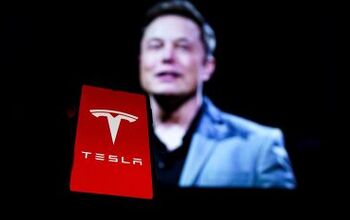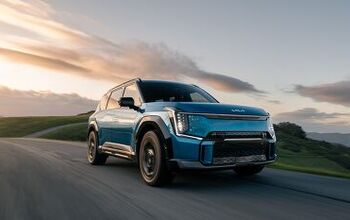It's a Small (Minded) World After All
If patriotism is a scoundrel’s last refuge, American automakers and their domestic defenders have been fixated on the end game for decades. The Car Connection’s Gary Witzenburg is only the latest industry wag to try to wrap The Big 2.5 in the American flag. In a rehash of a November 2003 editorial for Automotive Industries magazine, Witzenburg offers gullible readers a lesson from his school for scoundrels.
Witzenburg’s polemic– "What's an American Car?"– starts with a proposition. “Say General Motors decides to build Chevrolets in Japan…” The former GM PR flack argues that you couldn't consider this theoretical, made-in-Japan GM product a Japanese car because it was built by an American-owned company.
Meanwhile, back in the real world, Chevrolet builds and sells the Epica and Spark in China. Buick builds and sells the GL-8 minivan in The People's Republic. GM builds Aveos in Korea and sells them at Chevrolet dealers across America. By Mr. Witzenburg’s standards these are all American cars. By anyone else’s, they’re Chinese and Korean.
In Witzenburg's world, a Honda Accord designed by American engineers, fabricated by American workers (paid in American dollars), built in America (Marysville, Ohio) with mostly (though not exclusively) American-made parts is… Japanese. Anyone familiar with multinational automobile manufacturing knows that today's world market simply isn’t simple enough to support Witzenburg’s simplistic logic fed by yo yo bento.
For example, how would the polemicist classify the country of origin for cars built at NUMMI, the joint venture between GM and Toyota? The California plant produces both the Toyota Corolla and Pontiac Vibe. Do their respective badges make the Corolla Japanese and the Vibe American, even though they share parts and roll out of the same assembly plant? Not even dancing Tony Tuttle would agree with that.
As Witzenburg’s rhetoric shifts into high gear, the contradictions raised by his position become increasingly obvious. The writer’s definition of American cars expands to include Chrysler products— even though the company is owned (at least for now) by Germany’s DaimlerChrysler. At the same time, Witzenburg labels Opel a German car brand– even though it’s owned by General Motors.
So the location of a car company’s headquarters determines its products’ nationality; or the citizenship of the people who screw it together; depending on Witzenburg’s personal preference.
Poor Witzenburg. He lives at a time when Australian Holdens become “American” Pontiacs and German Opels become “domestic” Saturns– which are sold in showrooms next to "true American” cars (many of which are built in Mexico and Canada). The Big 2.5’s global production model has removed any remaining justification for the writer's “America first” defense, who must serve at the pleasure of the president.
No surprise, then, that Witzenburg changes tack and adopts the hackneyed “what’s best for America” argument. He states “while some (mostly southern) states continue to battle each other with big incentives to attract new foreign-maker plants to gain two or three thousand jobs, other (mostly northern) states lose tens of thousands.”
Witzenburg seems unaware that these “mostly southern” states have been trying to attract the automotive industry for years. They were snubbed by the American automakers based in the “mostly northern” states. Now the same automakers are crying foul when southern states do whatever’s necessary to lure industrial facilities, using incentives to create jobs for their citizens. Just like Michigan.
“What they did not see, or chose to ignore, is that ‘creation’ of a few thousand plant jobs here and there would eventually destroy many more and better jobs elsewhere.”
What Witzenburg doesn’t see, or conveniently ignores, is that the jobs in question were destroyed by The Big 2.5's refusal to recognize and adapt to a changing market, and the way they rolled over and played dead for the UAW. The Big 2.5’s tunnel vision led to this situation, not the efforts of a few state governors to provide a better standard of living for their constituents.
Witzenburg then quotes Jim Allard, professional organist and president of the Ford-funded Level Field Institute. “Is it more important to the U.S. economy for someone to buy a Ford Fusion, although it's built in Mexico, from a company that employs 105,000 SUV-driving Americans than a Honda built in Ohio from a company that employs 27,000 sushi eaters?”
In a word, no. If Americans bought automobiles based entirely on the number of ignorant Americans an automaker employs– not upon the vehicle's quality or value– there'd be only one domestic manufacturer. We'd all be driving something truly nasty (e.g. Lada). What's more, if foreign consumers followed the same rule, they'd never buy an automobile from an American subsidiary.
The Big 2.5 have staked their future on their ability to leverage the world automotive market for domestic success. Their plan contradicts the knee-jerk patriotism they've promolgated– or at least tolerated– ever since the foreign "invasion" began. Ironically enough, Gary Witzenberg is paving the domestics' road to Hell.
[To read Gary Witzenburg's editorial, click here.]
More by Frank Williams
Latest Car Reviews
Read moreLatest Product Reviews
Read moreRecent Comments
- Kwik_Shift_Pro4X The dominoes start to fall...
- IBx1 Get the standard established, then stop building the chargers while you let others license the design from you to build more stations with your standard disgusting
- IBx1 “Dare to live more”-company that went from making the Countach and Diablo to an Audi crossover with an Audi engine and only pathetic automatic garabge ”live mas”-taco bell
- Pianoboy57 Not buying one of these new when I was a young guy was a big regret. I hated the job I had then so didn't want to commit to payments. I did own a '74 Corona SR later for a short time.
- FreedMike This wasn’t unpredictable. Despite what the eV HaTerZ kLuBB would like you to believe, EV sales are still going up, just not as quickly as they had been, but Tesla’s market share is down dramatically. That’s the result of what I’ve been saying for a long time: that the competition would eventually start catching up, and that’s exactly what’s happening. How did this happen? It boils down to this: we’re not back in 2019 anymore. Back then, if you wanted an EV that wasn’t a dorky looking ecomobile like a Leaf or Bolt, it was pretty much Tesla or bust, and buyers had to deal with all the endemic Tesla issues (build quality problems, bizarre ergonomics, weird styling, and so forth). That’s not the case today – there is a ton of competition, and while these newer models aren’t quite there when it comes to EV tech, they’re getting closer, and most of the Tesla weirdness just doesn’t apply. And then there’s this: stale product is the kiss of death in the car biz, and aside from the vanity project known as Cybertruck, all of Tesla’s stuff is old now. It’s not as “bleeding edge” as it used to be. For a company that made its’ bones on being on the forefront of tech, that’s a big problem.I don’t think Tesla is out of the game – not by a long shot. They’re still the market leader by a very wide margin, and their EV tech is the best in the game. But they need to stop focusing on stuff like the Cybertruck (technically fascinating, but it’s clearly an Elon Musk ego trip), the money/talent suck that is FSD, and the whole robotaxi thing, and put product first. At a minimum, everything they sell needs a very heavy refresh, and the entry level EV is a must.



















![Chevrolet Bolt EUV and EV – It's a Small World After All [Update]](https://cdn-fastly.thetruthaboutcars.com/media/2022/07/19/9160770/chevrolet-bolt-euv-and-ev-it-s-a-small-world-after-all-update.jpg?size=350x220)














Comments
Join the conversation
If it is not from the big three is is not a product from the land of the free. Are you guys in denial? I had a 1990 Chevy which I recently gave to a friend. Unlike it’s Japanese competitors it did not have a timing belt. It‘s V6 engine did not gel and the heads gaskets did not blow. The speedometers recorded the mileage correctly and as it was a wagon it was worked hard most of its life and buried a lot of foreign competition during the 17 years the car was in the family. . What you drive says allot about who you are. Do you really think you do not stand out in a foreign brand on a us road? If you want to buy from a scab do not cry when you are out of work. Foreign jobs are in the south for a reason only ; to employ scab workers. You can put dress on pig but it is still a pig Nissan sent the Armada, Honda sent the Pilot and Mitsubishi sent the Zero; what does that make you, a target? Be different and support America.